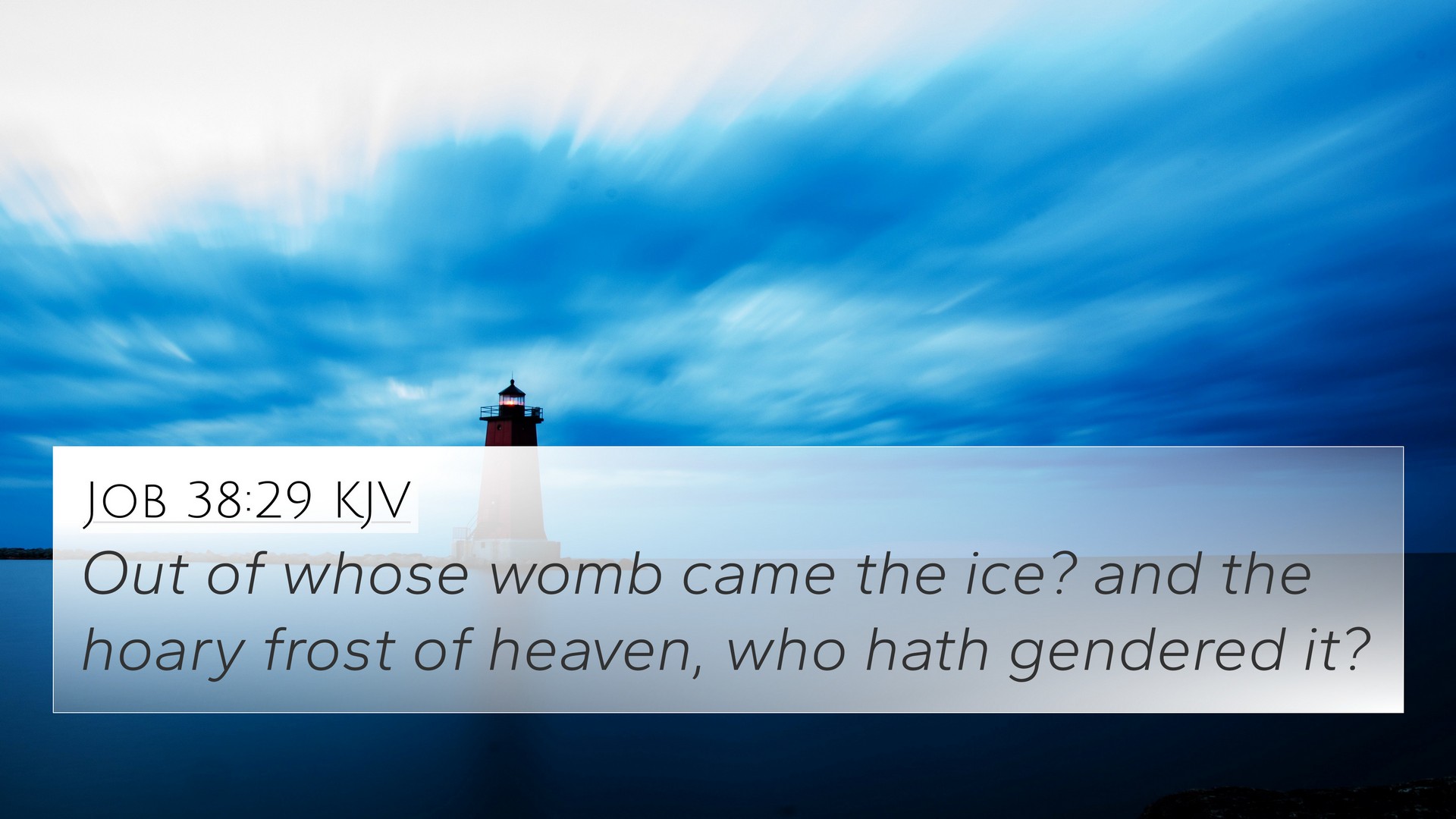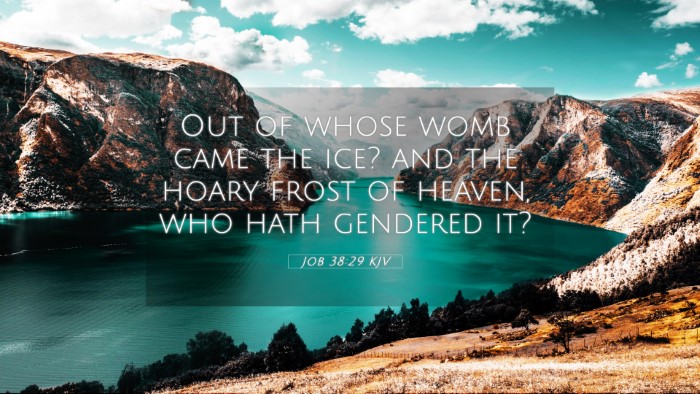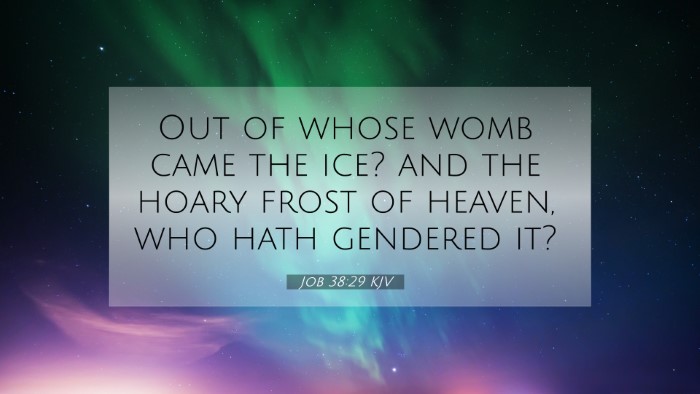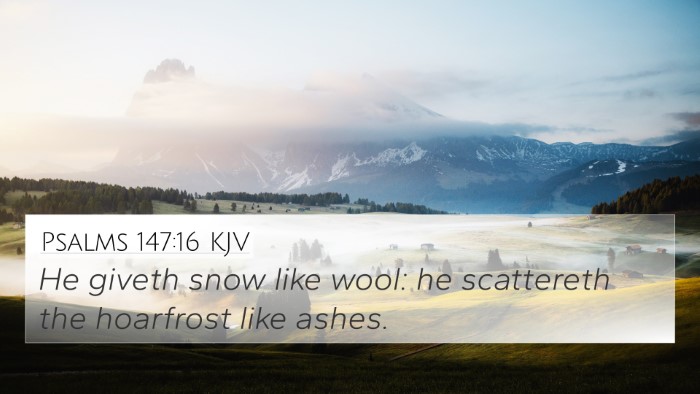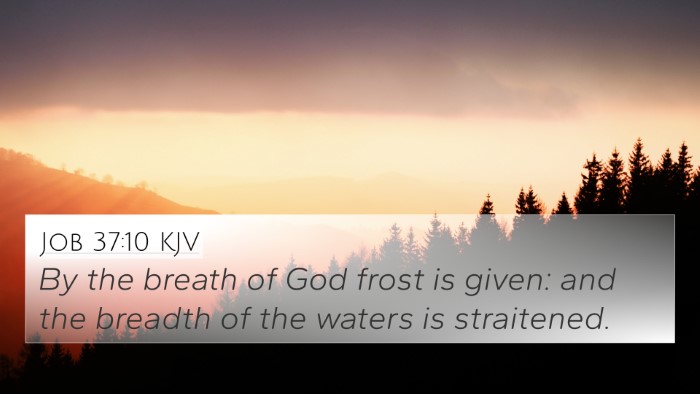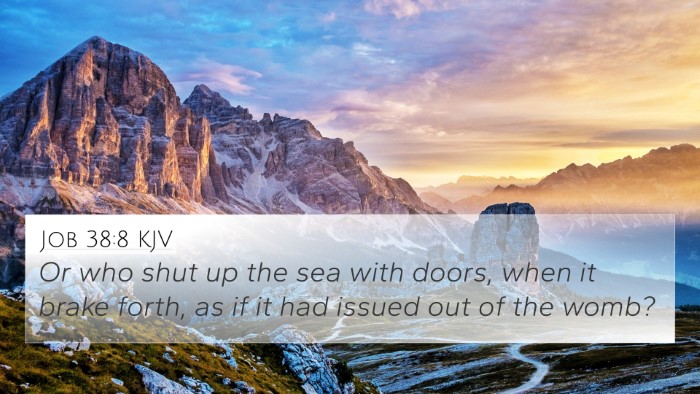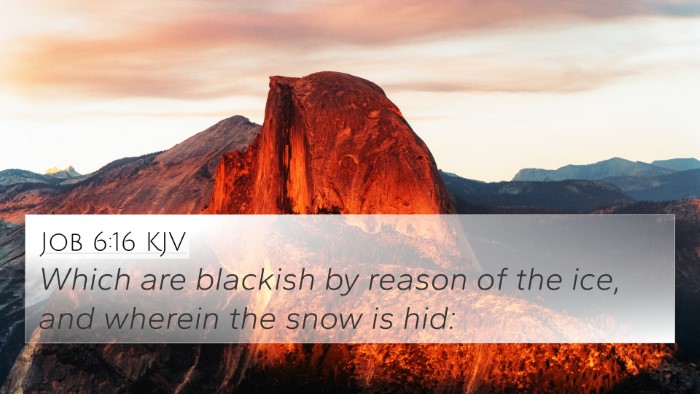Understanding Job 38:29
Job 38:29 reads:
“From whose womb did the ice come forth? And the hoary frost of heaven, who hath gendered it?”
This verse represents a profound moment in the Book of Job, where God responds to Job’s previous lamentations and questions. Throughout history, this verse has prompted deep theological reflection and analysis.
Contextual Insights
The dialogue between God and Job unfolds during a time when Job has lost everything and questions the justice and workings of God. This chapter illustrates God's rebuke to Job by challenging him to understand his place in creation.
- God’s Sovereignty: The verse emphasizes God’s absolute control over nature, highlighting that He is the creator of all things, including ice and frost.
- Creation’s Mystery: It poses rhetorical questions pointing to the mystery of creation; questions that demonstrate to Job how little he knows about the workings of the universe.
Commentaries’ Perspectives
Insights from various public domain commentaries provide a layered understanding of this complex verse:
-
Matthew Henry: Henry notes that God asks Job a series of questions to showcase His power and wisdom as the Creator. He suggests that the imagery of ice and frost illustrates God’s command over the elements and His creative power, which is far beyond human comprehension.
-
Albert Barnes: Barnes emphasizes that this verse serves to remind humanity of the omnipotence of God. He interprets the inquiry regarding the origins of ice and frost as a demonstration of God's authority over natural phenomena, thus refuting Job’s claims against divine justice.
-
Adam Clarke: Clarke believes this verse symbolizes the coldness of despair and suffering. He points out the term 'gendered' suggests an intentional creation, making it clear that just as ice and frost have their origins known to God alone, Job’s sufferings too are within His sovereign plan.
Bible Verse Cross-References
The thematic connections of Job 38:29 can be explored through various Bible verses:
- Genesis 1:1: “In the beginning God created the heaven and the earth.” – Establishes the fundamental truth of creation.
- Psalms 104:16: “The trees of the LORD are full of sap; the cedars of Lebanon, which he hath planted.” – Celebrates God’s ongoing creation.
- Psalms 147:16: “He giveth snow like wool: he scattereth the hoarfrost like ashes.” – A direct link to the frost and ice mentioned in Job.
- Isaiah 40:22: “It is he that sitteth upon the circle of the earth, and the inhabitants thereof are as grasshoppers.” – Highlights God's transcendence over creation.
- Job 37:6: “For he saith to the snow, Be thou on the earth; likewise to the small rain, and to the great rain of his strength.” – Another examination of God’s command over nature.
- Proverbs 30:4: “Who hath ascended up into heaven, or descended? Who hath gathered the wind in his fists? Who hath bound the waters in a garment?” – Reflects the majesty of God as the creator.
- Job 38:22-23: “Hast thou entered into the treasures of the snow? Or hast thou seen the treasures of the hail, which I have reserved against the time of trouble, against the day of battle and war?” – A deeper inquiry into God's dominion over the elements.
Thematic Connections
Linking Bible scriptures with Job 38:29 reveals an intricate relationship between human suffering and divine governance:
- Examining Psalms 33:8-9, where it is stated, “Let all the earth fear the Lord: let all the inhabitants of the world stand in awe of him. For he spake, and it was done; he commanded, and it stood fast.” holds a striking parallel in understanding God's creative authority.
- Through Colossians 1:16, which states, “For by him were all things created, that are in heaven, and that are in earth,” we find an overarching theme of Christ's role in creation linked to God's sovereignty in Job.
- The book of Ecclesiastes shares similar reflections on nature's order and God's control, notably in Ecclesiastes 3:11, where it states, “He hath made everything beautiful in his time.”
Comparative Bible Verse Analysis
The relationship of this verse to others showcases the theme of divine oversight:
- Job’s questioning leads to God’s revelations about the world – similar to how the New Testament often addresses human concerns about suffering, as seen in Romans 8:28 which affirms, “And we know that all things work together for good to them that love God.”
- Linking Job’s narrative with Hebrews 11:3 emphasizes faith: “Through faith we understand that the worlds were framed by the word of God.”
- In Isaiah 55:8-9, God acknowledges the vastness of His thoughts compared to human understanding, affirming the theme established in Job's discourse on creation.
Tools for Bible Cross-Referencing
For those wishing to explore biblical themes further, a variety of tools can aid in discovering connections:
- Bible Concordance: A helpful resource to identify specific terms such as “ice” or “frost” throughout the Scriptures.
- Bible Cross-Reference Guide: Guides help to find related verses for comparative studies.
- Cross-Reference Bible Study: Approaches using specific themes, aiding to uncover Biblical dialogues across Testaments.
- Bible Reference Resources: These can include software and print materials that simplify the cross-referencing process.
User Intent Keywords
Common queries regarding Job 38:29 may include:
- What verses are related to Job 38:29?
- Find cross-references for Job 38:29.
- How do Job 38:29 and Psalms 147:16 connect?
Conclusion
Job 38:29 encourages readers to reflect on their understanding of nature, suffering, and God's ultimate authority over creation. Through extensive cross-referencing and thematic analysis, we recognize that even in times of despair, the nature of God and His creation remains a testament to His power and love.
